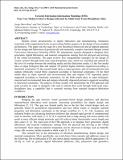Towards Fabrication Information Modeling (FIM): Four Case Models to Derive Designs informed by Multi-Scale Trans-Disciplinary Data
Author(s)
Duro-Royo, Jorge; Oxman, Neri
DownloadTowards fabrication.pdf (3.676Mb)
MIT_AMENDMENT
MIT Amendment
Article is made available in accordance with the publisher's policy and may be subject to US copyright law. Please refer to the publisher's site for terms of use.
Terms of use
Metadata
Show full item recordAbstract
Despite recent advancements in digital fabrication and manufacturing, limitations associated with computational tools are preventing further progress in the design of non-standard architectures. This paper sets the stage for a new theoretical framework and an applied approach for the design and fabrication of geometrically and materially complex functional designs coined Fabrication Information Modeling (FIM). We demonstrate systems designed to integrate form generation, digital fabrication, and material computation starting from the physical and arriving at the virtual environment. The paper reviews four computational strategies for the design of custom systems through multi-scale trans-disciplinary data, which are classified and ordered by the level of overlap between the modeling media and the fabrication media: (1) the first model takes as input biological data and outputs 3D printed digital materials organized according to functional constraints; (2) the second model takes as input geometry and environmental data and outputs robotically wound fibers organized according to functional constraints; (3) the third model takes as input material and environmental data and outputs CNC deposited pastes organized according to functional constraints; (4) the forth model takes as input biological, material and environmental data and outputs robotically deposited polymers organized according to functional constraints. The analysis of these models will demonstrate the FIM approach and point towards its value to designers who seek to inform their work through multi-scale transdisciplinary data, a capability that is currently missing from standard design-to-fabrication workflows.
Date issued
2015-06Department
Massachusetts Institute of Technology. Department of Architecture; Massachusetts Institute of Technology. Department of Urban Studies and Planning; Massachusetts Institute of Technology. Media Laboratory; Program in Media Arts and Sciences (Massachusetts Institute of Technology)Journal
MRS Proceedings
Publisher
Cambridge University Press
Citation
Duro-Royo, Jorge, and Neri Oxman. “Towards Fabrication Information Modeling (FIM): Four Case Models to Derive Designs Informed by Multi-Scale Trans-Disciplinary Data.” MRS Proceedings 1800 (2015). © 2015 Cambridge University Press
Version: Final published version
ISSN
1946-4274